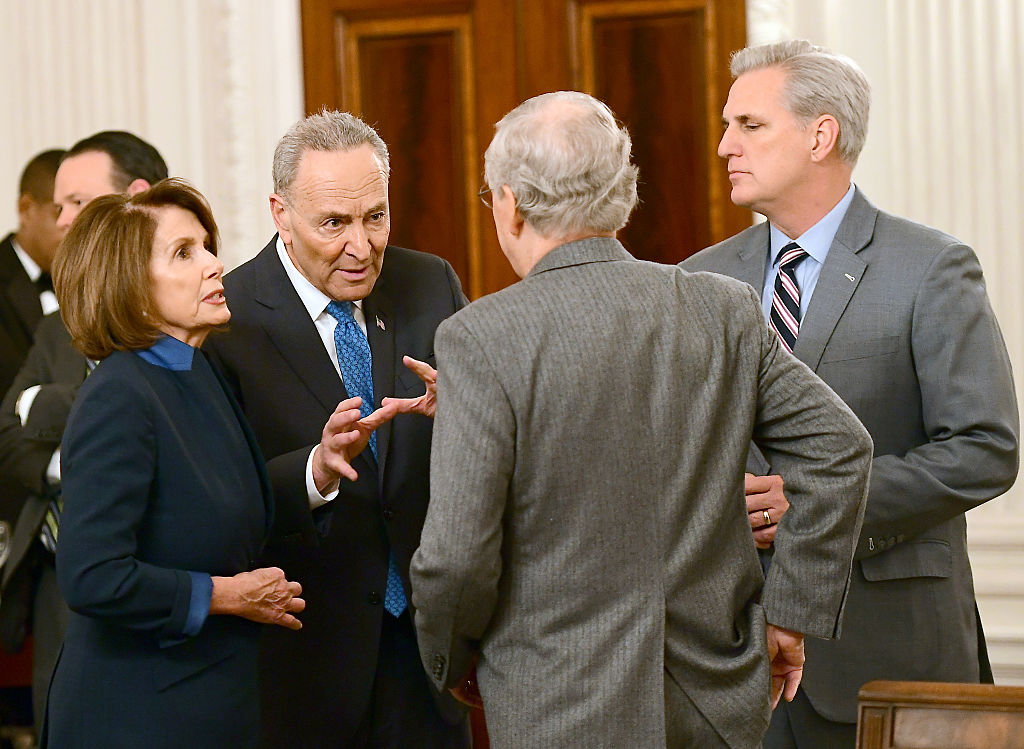The 4 most controversial provisions of the bipartisan $1.4 trillion spending package


A free daily email with the biggest news stories of the day – and the best features from TheWeek.com
You are now subscribed
Your newsletter sign-up was successful
The $1.37 trillion price tag on a package of spending bills expected to sail through Congress to President Trump's desk this week isn't all that controversial in Washington. There's plenty for everyone to love — and hate — among the $738 billion in military funding and $632 billion in non-military appropriations that will keep the federal government running though Oct. 1, 2020.
But along with its 12 must-pass annual appropriations bills, the 2,313-page spending package carries "an unusually large load of unrelated provisions catching a ride on the last train out of Congress this year," The Associated Press reports. Here are 4 of the most notable ones:
1. Youth smoking: The legislation raises the smoking age to 21, from 18, for both traditional tobacco products and vaping devices. The FDA will have six months to come up with regulations and three more years to work with states to enact them.
The Week
Escape your echo chamber. Get the facts behind the news, plus analysis from multiple perspectives.

Sign up for The Week's Free Newsletters
From our morning news briefing to a weekly Good News Newsletter, get the best of The Week delivered directly to your inbox.
From our morning news briefing to a weekly Good News Newsletter, get the best of The Week delivered directly to your inbox.
2. Gun-violence research: Democrats won $25 million for research into gun violence, breaking a two-decade de facto ban championed by the gun lobby. The National Institutes of Health and Centers for Disease Control and Prevention would each get $12.5 million to track gun-related deaths and injuries, along with other research. "Scientific reports show that a lack of data on gun violence has delayed pivotal reforms despite persistent mass shootings," Axios reports. Democrats laid the groundwork last year.
3. Trump's wall: The package maintains a steady $1.37 billion for new barrier along the U.S.-Mexico border, short of the $8.6 billion Trump had requested for his wall but with fewer strings and no language barring him from siphoning off money from other accounts. The bill does not backfill $3.6 billion in military construction funds Trump raided for his border wall and mostly flat-lines the budges of the two main border enforcement agencies.
4. ObamaCare taxes: Three taxes Democrats had enacted to help finance the Affordable Care Act get the ax, making official successive temporary suspensions of the "Cadillac" tax on expensive health plans, 2.3 percent tax on medical devices, and roughly 2.5 percent levy on health insurance premiums. "Democrats put a bunch of funding mechanisms in ObamaCare to keep the deficit down, only to get torched by Republicans" and "hounded by industry," explains Bloomberg's Sahil Kapur. "One lesson that some Democrats will take from the ObamaCare experience is that paying for programs brings you a world of political pain, whereas throwing them on the national credit card (à la Medicare Part D) is safe."
A free daily email with the biggest news stories of the day – and the best features from TheWeek.com
Peter has worked as a news and culture writer and editor at The Week since the site's launch in 2008. He covers politics, world affairs, religion and cultural currents. His journalism career began as a copy editor at a financial newswire and has included editorial positions at The New York Times Magazine, Facts on File, and Oregon State University.
-
 What is the endgame in the DHS shutdown?
What is the endgame in the DHS shutdown?Today’s Big Question Democrats want to rein in ICE’s immigration crackdown
-
 ‘Poor time management isn’t just an inconvenience’
‘Poor time management isn’t just an inconvenience’Instant Opinion Opinion, comment and editorials of the day
-
 Bad Bunny’s Super Bowl: A win for unity
Bad Bunny’s Super Bowl: A win for unityFeature The global superstar's halftime show was a celebration for everyone to enjoy
-
 TikTok secures deal to remain in US
TikTok secures deal to remain in USSpeed Read ByteDance will form a US version of the popular video-sharing platform
-
 Unemployment rate ticks up amid fall job losses
Unemployment rate ticks up amid fall job lossesSpeed Read Data released by the Commerce Department indicates ‘one of the weakest American labor markets in years’
-
 US mints final penny after 232-year run
US mints final penny after 232-year runSpeed Read Production of the one-cent coin has ended
-
 Warner Bros. explores sale amid Paramount bids
Warner Bros. explores sale amid Paramount bidsSpeed Read The media giant, home to HBO and DC Studios, has received interest from multiple buying parties
-
 Gold tops $4K per ounce, signaling financial unease
Gold tops $4K per ounce, signaling financial uneaseSpeed Read Investors are worried about President Donald Trump’s trade war
-
 Electronic Arts to go private in record $55B deal
Electronic Arts to go private in record $55B dealspeed read The video game giant is behind ‘The Sims’ and ‘Madden NFL’
-
 New York court tosses Trump's $500M fraud fine
New York court tosses Trump's $500M fraud fineSpeed Read A divided appeals court threw out a hefty penalty against President Trump for fraudulently inflating his wealth
-
 Trump said to seek government stake in Intel
Trump said to seek government stake in IntelSpeed Read The president and Intel CEO Lip-Bu Tan reportedly discussed the proposal at a recent meeting
